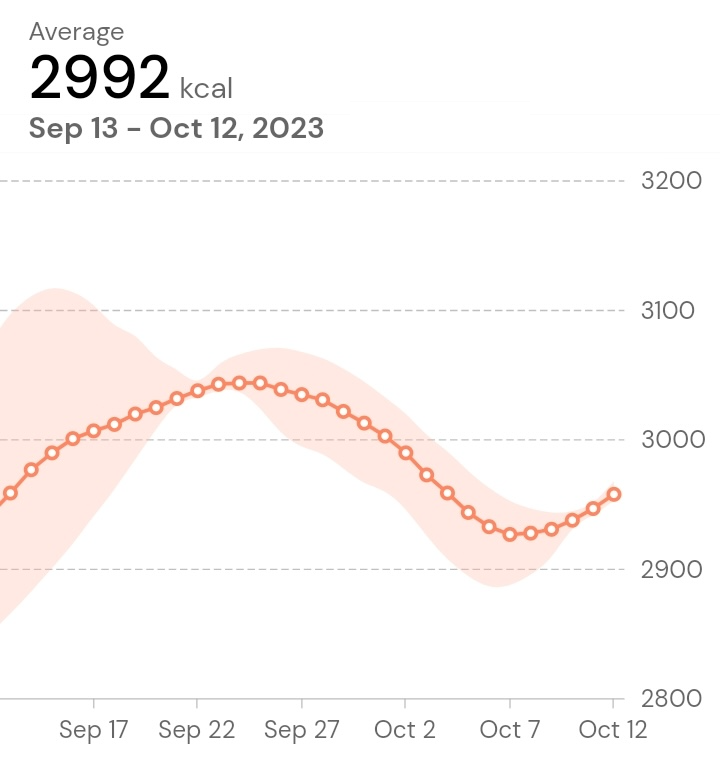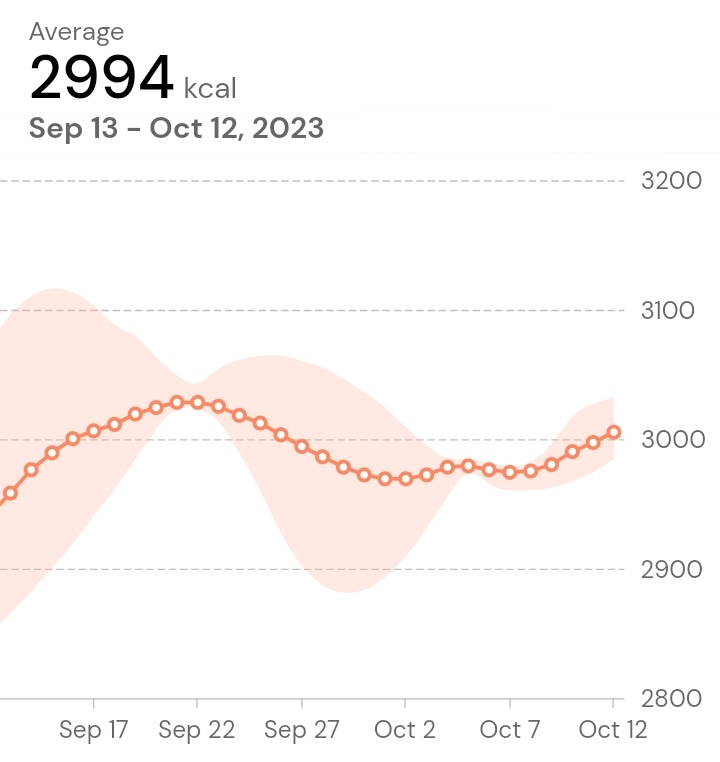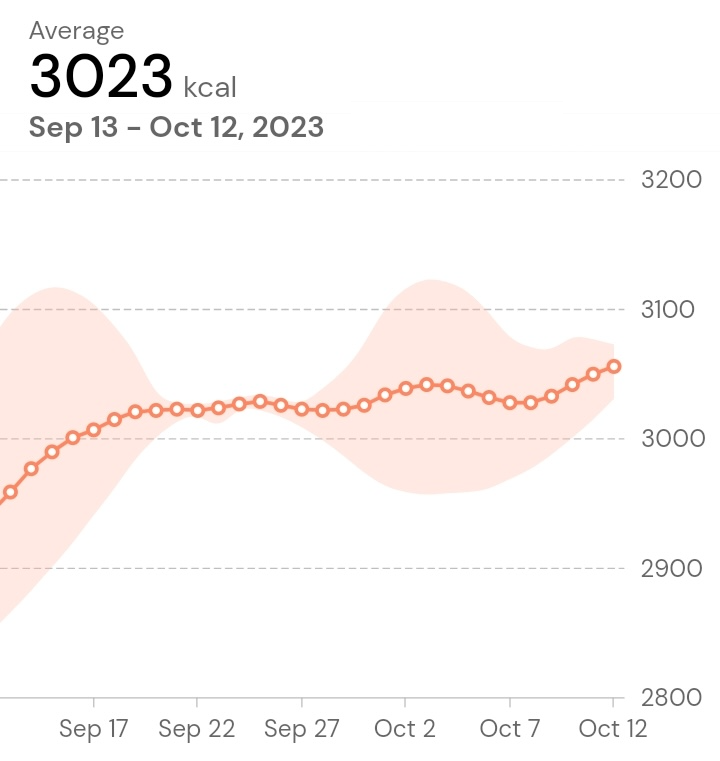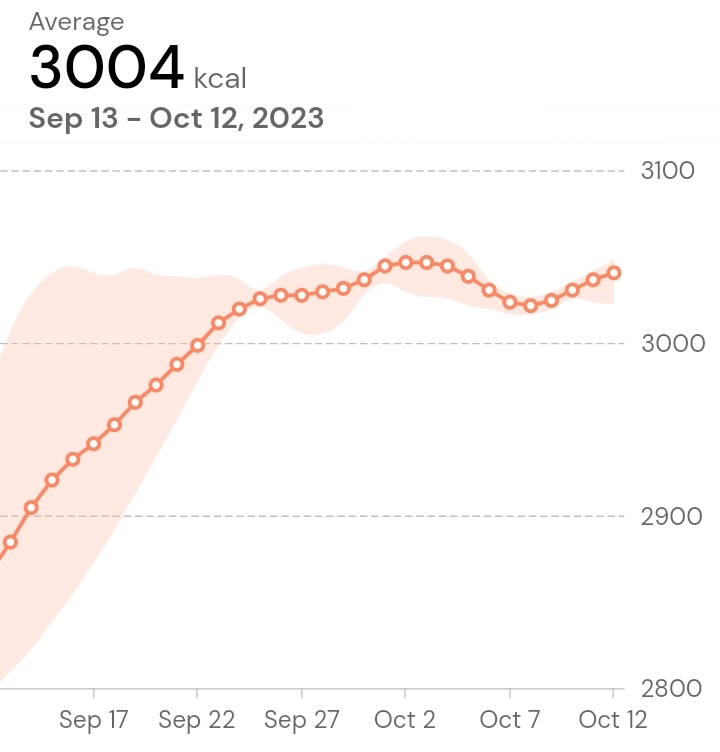MacroFactor’s expenditure calculation is based on your weight trend and energy intake, and weekly coaching adjustments are based on expenditure changes. So, that leads some users to wonder whether they should still log their weight on days when they feel their body weight is atypical and unrepresentative of their “true” weight, due to concerns that doing so will negatively impact their energy intake recommendations.
Ultimately, it’s a matter of preference.
There’s no problem with not logging your weight on days you believe it to be atypical or unrepresentative, or even on days you just don’t feel like logging your weight. In general, we’d recommend logging your weight at least three times per week, but you can still get consistent program updates if you just log your weight once per week.
However, logging your weight on those days is also perfectly fine, and it’s what we’d generally recommend for most people.
Potential psychological benefits of logging every day
For people who’ve struggled with weight-related goals, weighing can lead to some stress, but much of that stress is the result of value judgments we attach to the number on the scale. Self-monitoring body weight helps people successfully change their weight, and maintain those changes over time, so reducing the stress of weighing can help improve both your psychological well-being and your long-term results.
Getting into the habit of simply recording your weight each day without attaching a judgment to the number on the scale may help reduce the stress of weight monitoring: weight exposure in a non-judgemental context is frequently used in the treatment of eating disorders, for instance. Conversely, actively considering whether the number on the scale is representative or unrepresentative of your "true" weight can reinforce the unhelpful value judgments that are often attached to body weight. Most of the time, evaluating whether the number on the scale is representative of your “true” weight just results in evaluating low numbers as “good” and high numbers as “bad,” thus reinforcing the value judgments that cause anxiety about weight monitoring – it’s rare for people to avoid logging their weight because they think the number on the scale is too low to be representative of their “true” weight.
The (small) impact of weight fluctuations on MacroFactor's calculations
Beyond psychological consideration, weight fluctuations of any reasonable duration and magnitude have a relatively trivial impact on your expenditure and program recommendations in MacroFactor. Your expenditure is calculated based on trend weight changes, not the raw numbers on the scale. Scale weight fluctuations ultimately have a fairly trivial impact on your weight trend most of the time, so they rarely have a considerable impact on your calculated expenditure or program recommendations.
To illustrate, my expenditure is 3016 as of the time of writing. To test the impact of weight fluctuations on my current expenditure, I’ll increase my scale weight by 4, 3, and 2 pounds on consecutive days, 1-6 weeks ago from the present day.

My expenditure graph today, with no weights edited.
When increasing my scale weights one week in the past (i.e. when I say I was actually 4 pounds heavier seven days ago, 3 pounds heavier six days ago, and 2 pounds heavier five days ago), my expenditure today is calculated to be 2957 Calories.

My expenditure graph today, with my scale weights increased by 4, 3, and 2 pounds on October 5th, 6th, and 7th.
When increasing my scale weights two weeks in the past, my expenditure today is calculated to be 2958 Calories.

My expenditure graph today, with my scale weights increased by 4, 3, and 2 pounds on September 28th, 29th, and 30th.
When increasing my scale weights three weeks in the past, my expenditure today is calculated to be 3006 Calories.

My expenditure graph today, with my scale weights increased by 4, 3, and 2 pounds on September 21st, 22nd, and 23rd.
When increasing my scale weights four weeks in the past, my expenditure today is calculated to be 3056 Calories.

My expenditure graph today, with my scale weights increased by 4, 3, and 2 pounds on September 14th, 15th, and 16th.
When increasing my scale weights five weeks in the past, my expenditure today is calculated to be 3056 Calories again.

My expenditure graph today, with my scale weights increased by 4, 3, and 2 pounds on September 7th, 8th, and 9th.
When increasing my scale weights six weeks in the past, my expenditure today is calculated to be 3041 Calories. Going back further, that value continues decreasing for another couple of weeks, until it settles back at 3016.

My expenditure graph today, with my scale weights increased by 4, 3, and 2 pounds on August 31st, and September 1st and 2nd.
So, weight fluctuations of that magnitude may have resulted in weekly energy intake recommendations that were, at most, ~50 calories higher or lower than my actual recommendations over this time span, which is ultimately a relatively minor difference. And, because of the additional smoothing logic applied to program recommendations, the actual impact on my weekly program adjustments likely would have been even smaller yet.
Furthermore, to the extent that these fluctuations represent (small) errors, those errors are self-correcting – your recommendations are a touch lower for a couple weeks (because it initially appears that you’re losing weight slower or gaining weight faster than you actually are), and then a touch higher for a couple weeks (when you lose the weight you were momentarily retaining, it appears that you’re losing weight faster or gaining weight slower than you actually are).
As you can see from the screenshots above, my average calculated expenditure for the past month has actually been 3019 Calories, with no prior weights edited. When retrospectively editing prior entries to show the impact of weight fluctuations, my average expenditure for the past month stayed between 2992 and 3023 Calories. So, my total energy intake recommendations for this path month would have been essentially unaffected.
When is it just bloating or fluid retention, and when it is "actual" weight gain?
Now, weight fluctuations that are larger or longer-lasting could have a larger impact on your expenditure and program recommendations, but by the same token, weight fluctuations that are larger or longer-laster are often indicative of actual body weight changes. For instance, if the number on the scale increases by 7 pounds following a holiday weekend, and it’s still 1-2 pounds above your prior baseline a week or two later, it’s not unlikely that you did actually gain a pound or two. If you didn’t log your weight during that time because you believed the values were unrepresentative of your “true” weight, it would just take a bit longer for your expenditure algorithm and program recommendations to respond appropriately to that change.
So, logging your weight every day typically won’t result in energy intake recommendation errors of any significant magnitude if you experience weight fluctuations that aren’t indicative of actual energy expenditure changes. Furthermore, logging your weight every day will typically help your recommendations respond more quickly and appropriately to actual energy expenditure changes.
Ultimately, we developed MacroFactor’s algorithms to handle just about anything you throw at them. If the algorithms couldn’t deal well with the sorts of normal weight fluctuations we all experience from time-to-time, we wouldn’t have made them the cornerstone of the app’s coaching features. As long as you log your weight and nutrition consistently and with sufficient accuracy, MacroFactor will be able to generate accurate recommendations and make appropriate adjustments to help you reach your goals.
Wrapping up
Just three quick notes before wrapping up:
1) Don’t construe anything in this article as medical advice. If you have really serious ongoing stress and anxiety about weighing yourself, it may not be a bad idea to be evaluated by an appropriately credentialed medical professional.
2) Just to reiterate, it is perfectly fine to not record your weight on days you believe the number on the scale to be unrepresentative. As long as you’re logging your weight at least two or three times per week, you’re in good shape. The impact (either positive or negative) of logging your weight more frequently on your expenditure and program recommendations will be pretty trivial.
3) If you want, you can delete or edit prior weight entries to test the effect of those manipulations on your calculated expenditure, just like I did in this article. Since the expenditure calculation is deterministic, you can undo any changes by just re-entering your original data. If you do this, we’d recommend making note of your original weight data before making any edits.
